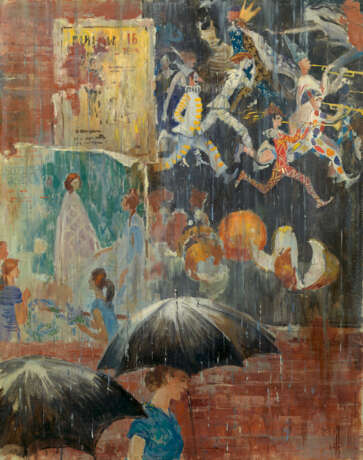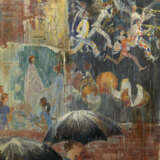ID 70673
Lot 8 | PIMENOV, YURY (1903-1977) Wet Posters , signed with initials and dated 1973.
Valeur estimée
£ 150 000 – 200 000
Provenance: Private collection, Europe.
Authenticity certificate from the expert T. Zeliukina.
Authenticity certificate from the expert T. Levina.
Related literature: For a poster design, see Yu. Pimenov, Tainstvennyi mir zrelishch, Moscow, Sovetskii khudozhnik, 1974, Liubov k trem apelsinam, illustrated.
For similar work and a poster design, see Yury Ivanovich Pimenov, Moscow, Sovetskii khudozhnik, 1986, No. 123, illustrated; p. 194, No. 446, listed; No. 114, illustrated.
Yury Pimenov, one of the leading artists in the legendary Society of Easel Painters (OST) in the 1920s and later – of the “thaw” generation in the 1950–1960s, worked a lot as a set designer for the theatre and cinema. For 50 years, he designed many productions in the most diverse genres – drama, ballet and opera – at various theatres in Moscow, Leningrad and London.
When creating a unified image for a play or film, besides handling the stage layout and creating costume sketches, Yury Pimenov focused particularly on the poster as the defining exponent of this multiple system of “spectacle art”. A poster, in his view, extended its purpose significantly, having as its main purpose not only sudden attraction of a viewer’s attention, but also preservation of the heartfelt feeling of empathy or elation gained from what has been seen in a film or stage performance or at an art exhibition in a museum. It was this “mysterious world of spectacles” that caused a whole eponymous series of paintings to appear in Yury Pimenov’s work in the late 1960s and early 1970s. The presented for auction painting Wet Posters belongs to this series (there were three versions of the canvas). Being an artist of the “ordinary, real-life occurrences of every day”, in Wet Posters Yury Pimenov switched to an updated form of impressionism, acknowledging that his main creative principle was “the wonderful moment, the delicate and artistic image of an impression”.
We are grateful to the art historians Tatiana Zeliukina and Liubov Lapteva for providing additional catalogue information.
Yury Pimenov’s lyrical canvas Wet Posters is one of the artist’s most recognisable and popular images. It is impossible to determine the genre to which it belongs – urban sketch, decorative fantasy or landscape: everything blends seamlessly together in this wonderful, delicately coloured canvas. We have a city scene. Warm summer rain is pouring down, blurring the clarity of the outlines. The city folk are going about their business, hurrying past a building plastered with posters. In the foreground is a graceful, girlish profile beneath a black, rain-dampened umbrella. At one and the same time, this alludes to the artist’s earlier compositions of the 1950s and 1960s (Heavy Rain, 1957; Downpour, 1963 and Pensive Girl 1965), pays homage to Renoir’s The Umbrellas (1881–1886) and acknowledges the lyrical mood of The Umbrellas of Cherbourg, an extremely popular film in the late 1960s that drew on the legendary music of Michel Legrand.
Such Moscow scenes provided the basic inspiration for Pimenov’s best works from the second half of the 1950s to the early 1970s. The everyday life of the capital and the vibrant signs of the times, viewed seemingly by chance and in passing, emerge from the features of the city, its squares and main thoroughfares, and from the poster pillars with their announcements marking the major events of the moment.
Even if the work had not been dated, it would be quite easy to identify the time at which it was painted. The artist embarks on a kind of game with the viewer, making real posters about Moscow’s cultural life in the early 1970s integral subjects of the canvas. These posters – about Sergei Prokofiev’s opera Love for Three Oranges at the Bolshoi Theatre and Viktor Borisov-Musatov’s exhibition at the Tretyakov Gallery – were created by Pimenov too. But the life of a theatrical poster is short. Once the sounds of the orchestra have died away, the footlights have faded and the exhibition in a museum has given way to another, then no trace is left of the posters recently pasted all over the city. The artist, who is upset by this fleeting and ephemeral nature of his creations, brings some of these works together in a special series, Tainstvennyi mir zrelishch (The Mysterious World of Spectacles), and also finds a clever solution by including depictions of his favourite ones in his easel paintings.
This artistic technique, which is found in the composition Wet Posters, proved to be so successful that the artist used it twice in his later works with a similar title. In particular, the Museum of Russian Impressionism (Moscow) houses another variation on the same theme, in which Pimenov alters the characters in the foreground and brings his main female figures as close as possible to the surface of the wall. But, most importantly, the posters themselves change. Now they are advertising an exhibition of Anna Ostroumova-Lebedeva’s work, a show based on Alexander Ostrovsky’s play Talents and Admirers and even the autumn racing at the racetrack. The idea of including posters that clearly record the onward march of time into the lives of the characters in his painting and graphic compositions occurred to Pimenov in the 1950s (Fresh Posters). This was influenced not only by the artist’s characteristic fondness in his work for depicting the “present moment” and for the still-life element that is invariably present in his urban compositions, but also by a poignant attitude towards his characters, whose simple, mundane affairs and day-to-day toil make up the life of any city.
In the pictures of the early 1970s, however, thanks to the “personalisation” of the rain-sodden poster images that are literally disappearing before one’s very eyes under the streams of water, Pimenov brings a personal, nostalgic note to his work by giving the decorative element in the background its own meaning. The traditional idea of vanitas in classical painting, the transience of all that exists, becomes in Pimenov’s canvases an optimistic appeal to admire and cherish every moment of being by discovering, as the artist himself put it, “the world of the tremulous sensation of the unusualness of ordinary life”.
| Adresse de l'enchère |
MacDougall Arts Ltd. 63 New Cavendish St. W1G 7LP London Royaume-Uni | |
|---|---|---|
| Aperçu |
| |
| Téléphone | +44 20 7389 8160 | |
| Téléphone | +7 495 799 4683 | |
| Fax | +44 (0) 20 7389 8170 | |
| Conditions d'utilisation | Conditions d'utilisation | |
| transport |
Service postal Service de messagerie ramassage par vous-même | |
| Modes de paiement |
Virement bancaire |




